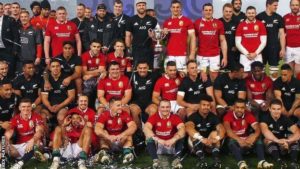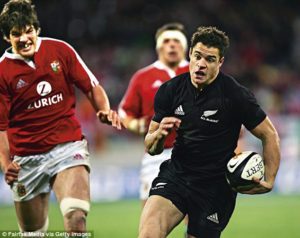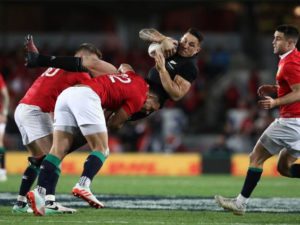New York, NY – As referee Romain Poite blew the final whistle in Auckland on Saturday, bringing to a close the 2017 British and Irish Lions tour, it was impossible to know how to feel as a rugby fan. After six weeks of enthralling rugby and three gripping test matches, the series ended in a draw; a dissatisfying and anticlimactic conclusion for both sets of players and fans, leaving both sides somewhat deflated. The Lions were soundly beaten in the first test and rode their luck at times in both the second and the third; they played against 14 men for 55 minutes in Wellington while Beauden Barrett let nine points go begging from the tee, and the All Blacks butchered several gilt-edged try scoring opportunities last weekend in Auckland and again Barrett misfired with the boot, this time leaving five points unconverted. However, to remember this tour as the Lions managing to “snatch” a drawn series from the All Backs would be wrong; that notion denigrates the herculean work done by the Lions coaches and staff over the past six weeks, and overlooks the smart technical changes the Lions made during the test series, particularly between tests one and two. There is no doubt that New Zealand remain the number one team in the world; their consistently excellent form over the past two years and the incredible strength in depth they possess in every position has earned them this title, however in this series they came up against a Lions side which was able to go toe-to-toe with them and walk away from a three-test series with the honours shared.

Prior to the Lions departing for New Zealand in late May, consensus was that the best they could aspire to was damage limitation; the Kiwi provincial Super Rugby sides (all of whom the Lions were set to play) were flying high above their Australian and South African counterparts, and the All Blacks were the back to back World Cup winners, unbeaten at home since 2009, with reigning World Rugby Player of The Year Beauden Barrett pulling the strings at fly half. Sending a team which had never played together before, regardless of the class of its individual members, up against such a well-oiled rugby juggernaut seemed like sending lambs to the slaughter. Even the most fervent Lions fans (myself included) were concerned about the potential for embarrassment, which would embolden the voices of those who claim the Lions concept is incompatible with professional-era rugby; memories of the disastrous 2005 tour to New Zealand resurfaced, on which the Lions lost all three tests, by an average margin of 22 points.

Happily, the Lions proved us all wrong; victories against the Crusaders, New Zealand’s highest ranked super rugby franchise, the Chiefs and the Maori All Blacks served notice that this Lions side could compete, as their lightening fast defensive line speed and dominant set piece had the much-vaunted warm up opposition on the back foot. Although the Lions lost the first test 30-15, they scored one of the great Lions tries of all time in the first half, and had the All Blacks under substantial pressure at the beginning of the second, failing to finish some excellent attacking opportunities close to New Zealand’s line; a lack of clinical execution which would come back to haunt them as the All Blacks asserted themselves in the second half. Lions head coach Warren Gatland made bold selection calls to address the Lions’ shortcomings ahead of the second test, bringing in Maro Itoje and Sam Warburton to beef up the defence of the breakdown, and adding Jonny Sexton to the backline as an additional distributor. While it is easy to say the Lions’ second test victory should be asterisked due to the red card received by Sonny Bill Williams after 25 minutes, discipline is a key component of any successful rugby side, and with the All Blacks unable to keep theirs, they paid the price. The Lions fought their way back from a nine point deficit while it was 14 vs 14 following Mako Vunipola’s yellow card, and the Lions defence kept the World Cup holders tryless at home for the first time in 39 years. World class goal kicking proved to be a decisive factor; as Barett misfired, Owen Farrell held his nerve to put the tourists in front with three minutes to go.

In the final test, the All Black’s scored two stunning tries in the first half, but failed to execute inside the Lions 22 on multiple occasions, making unforced handling errors with the try line in sight. The Lions too had their chances to score tries in both halves which they failed to capitalise on, but the unerring boots of Farrell and Elliot Daly kept their team in the match. Much has been made of the referee’s decision to only award New Zealand a scrum after Liam Williams appeared to knock the ball forward into Ken Owens’ arms following the final restart of the match. Firstly, given the referee’s decision that the ball had gone forward off Williams, the sanction should undoubtedly have been a penalty to the All Blacks; this appeared to be the decision Poite had settled on after his conversation with TMO George Ayoub, however he then inexplicably changed his mind, awarding a scrum to New Zealand on the basis that Owens was in fact accidentally offside. The notion that Owens could not avoid touching the ball and was thus accidentally offside is disproven by the footage; Owens had the chance to avoid the ball entirely but instead instinctively grabbed it as it fell to him, then immediately dropped it as he realised his apparent infringement. However a key point which I feel has been overlooked in this debate is whether the ball did indeed go forwards off Williams. I have re-watched the incident multiple times in slow motion and I am convinced the ball travelled backwards or at worst flat off Williams, meaning Owens had every right to play it. Even after that controversial call, both sides had opportunities to attack but neither could capitalise; one wonders whether Barrett’s goal kicking issues were behind the All Blacks’ decision to go for a try with the final possession rather than set up for a drop goal, the much higher percentage route to victory, once they were in range.

I hope this tour is remembered as a titanic clash of two phenomenally talented teams, who produced an utterly absorbing test series which was ultimately so close that a victor could not emerge. Red cards, injuries, weather conditions and missed kicks at goal are part of rugby and have to be dealt with; I hope these are not rolled out to belittle the quality of a colossal Lions side. While a draw is an outcome no one likes to see in sport, particularly at the elite level, if 240 minutes of test match rugby can’t separate two teams, forcing a winner would be cruel, for this was a series neither team deserved to lose. Both teams will have regrets at not taking their chances to claim victory outright, and the Lions will feel more proud of the result than the All Blacks given how heavily the odds were stacked in New Zealand’s favour, but that Lions pride will stop short of happiness; no elite athlete is truly happy with a draw in a series of this magnitude.

By far the biggest positive to come out of this tour is the consensus that the Lions must prevail as a concept. With over 120 years of rich history behind them, this group proved the Lions can still produce truly competitive sides which will challenge the best teams in the world and provide pulsating rugby for fans around the globe to enjoy. The extent of the Lions’ travelling support demonstrated that there is still a massive fanbase behind the Lions, and the economic benefits which will have been enjoyed by New Zealand Rugby and the local businesses in the cities the Lions travelled to are very significant. The Lions are unique in all of sport, and for the past six weeks they have fascinated the rugby world; I sincerely hope their tours continue as a bastion of the sport we love so much. Roll on South Africa 2021!
That’s all for now, please feel free to comment below, look for and “Like” our Facebook Rugby Wrap Up Page , Instagram, @RugbyWrapUp and follow us on Twitter@: @RugbyWrapUp, @Ronan Nelson, @MichaelHalsey24, @Matt_McCarthy00, @Junoir Blaber, @JWB_RWU, @Luke Bienstock, @MeetTheMatts, @Brian C Cole and @Declan Yeats.

